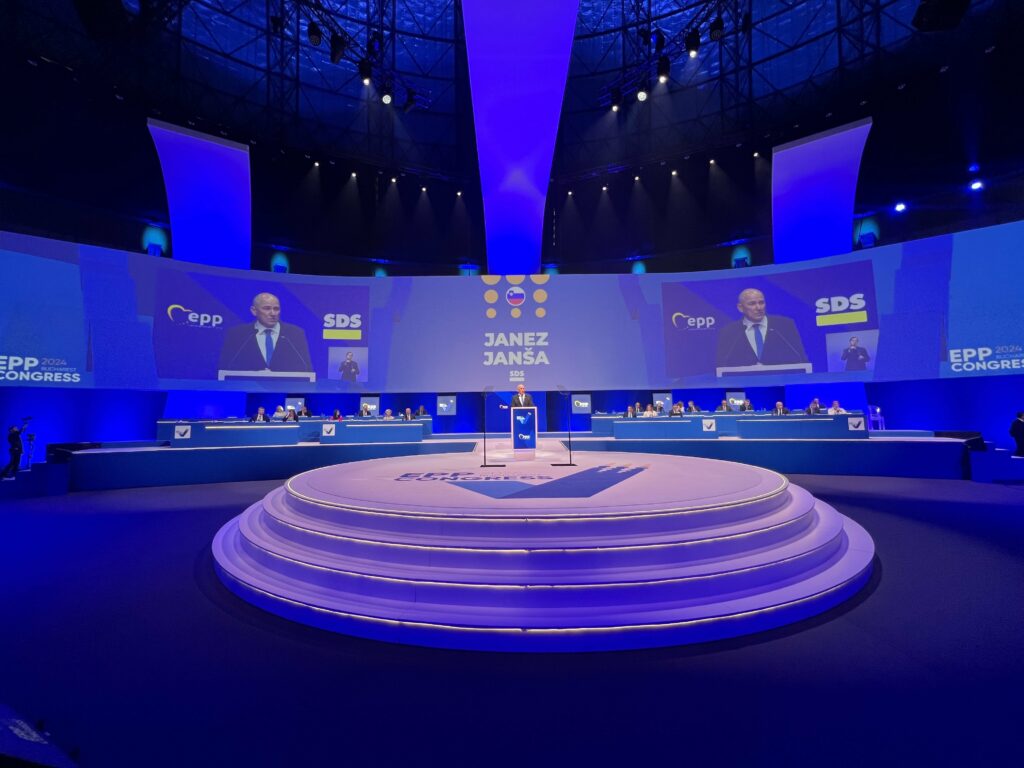The Congress of the European People’s Party (EPP) was held on Wednesday and Thursday in Bucharest, and it was also attended by a delegation of the Slovenian Democratic Party (Slovenska demokratska stranka – SDS) – one of EPP’s members. At the EPP Congress, SDS party President Janez Janša spoke about the main challenges that the European Union is facing at the moment. On Thursday, the EPP Congress also endorsed the President of the European Commission, Ursula von der Leyen, as the leading candidate for the June European elections, with the support of the New Slovenia party (Nova Slovenija – NSi) delegates, while the SDS party and the Slovenian People’s Party (Slovenska ljudska stranka – SLS) opposed her endorsement as the leading candidate for the elections to the European Parliament.
The SDS party was represented by seven delegates at the EPP Congress in Bucharest. In addition to Janez Janša, current MEPs Romana Tomc and Milan Zver, as well as Aleš Hojs, Branko Grims, Franc Breznik, Zala Tomašič, and Karin Planinšek, all of whom are on the SDS party’s candidate list for the European elections, attended the EPP Congress.
Among the other Slovenian members of the EPP, the NSi party and the SLS party also attended the congress.
They do not support Ursula von der Leyen
The delegates of the SDS party did not express their support for Ursula von der Leyen as the EPP’s leading candidate at the congress, as both MEPs from this party were already critical of her when her candidacy for the so-called spitzenkandidat was announced.
According to MEP Romana Tomc, von der Leyen is a weak leader: “Ursula von der Leyen is not my choice, and I do not support her. I am not convinced by her performance and even less by her past decisions, many of which have been completely wrong. Even if she tries to convince others with her sophisticated communication, she is a weak leader. Europe needs decisiveness in action – not just in words – in the period ahead.”
MEP Zver, for his part, expressed his dissatisfaction with her work in the current mandate, especially in the area of the green transition. “In the next mandate, Europe’s economy and agriculture will have to be tackled, and I am not sure that those who have made the wrong decisions in this mandate can do so,” Zver said at the end of February.
The EU is facing the challenge of strengthening its economy and defence
Also speaking at the Congress on Thursday, the SDS party President Janez Janša said that the main challenges that the European Union is currently facing are the war in Ukraine and the strengthening of the European economy and agriculture, which provide a real basis for development and prosperity. All European Union countries who are also members of NATO should reach the level of allocating at least 2 percent of GDP for defence and triple aid to Ukraine this year, Janša pointed out.
“The possible emergence of a new crisis hotspot in the Pacific and the consequent substantial reduction of the USA military presence in the Atlantic and the Mediterranean without swift EU action could spell disaster for EU security,” Janša warned in his address, adding that “there is a broad consensus in the EU on a gradual transition to a low-carbon society. But this transition has to be sensible, which is not the case at the moment. Modern civilisation today is based on electricity. But a kilowatt hour costs 5 cents in China, 12 cents in the US and 20 cents in the EU, which emits less than 10 percent of CO2 into the atmosphere.”
You are only as popular as the number of votes you get in free elections
Janša also believes that the EU must take its borders seriously and protect the way of life of those who live here. “For internal cohesion, it must become self-evident that our way of life must be determined by those of us who live here, not by those who come. The EU must finally take its external borders and the status of citizens of EU Member States very seriously.”
The SDS party President Janez Janša also referred to the various ways in which democracy is being undermined by non-governmental organisations and stressed that networks and attempts to establish the rule of the unelected must be resisted and we must return to the fundamental principles of democracy: “You are only as popular as the number of votes you get in free elections.”
L. K.


